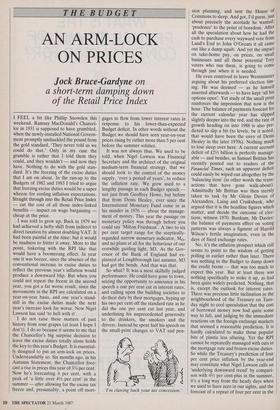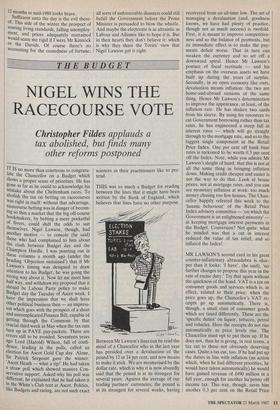THE BUDGET
AN ARM-LOCK ON PRICES
Jock Bruce-Gardyne on a short-term damping down of the Retail Price Index I FEEL a bit like Philip Snowden this weekend. Ramsay MacDonald's Chancel- lor in 1931 is supposed to have grumbled, when the newly-installed National Govern- ment promptly unshackled the pound from the gold standard, 'They never told us we could do that.' Only in my case the grumble is rather that I told them they could, and they wouldn't — and now they have. Nothing to do with the gold stan- dard. It's the freezing of the excise duties that I am on about. In the run-up to the Budgets of 1982 and 1983 I tried to argue that freezing excise duties would be a super wheeze for cooling inflation expectations. Straight through into the Retail Price Index — cut the cost of all those index-linked benefits — impact on wage bargaining cheap at the price.
I was told to grow up. Back in 1979 we had achieved a hefty shift from indirect to direct taxation by almost doubling VAT. It had been painful at the time: but it would be madness to fritter it away. More to the point, tinkering with the RPI like that would have a boomerang effect. In year one it was beezer, since the absence of the conventional increase in excise duties to reflect the previous year's inflation would produce a downward blip. But when you could not repeat the freeze in the second year, you got a far worse result, since the movements in the RPI are calculated on a year-on-year basis, and one year's stand- still in the excise duties made the next year's increase look far worse. Now Nigel Lawson has said 'to hell with it'.
I do not raise these matters of past history from sour grapes (at.least I hope I don't). I do so because it seems to me that the Chancellor's big surprise decision to leave the excise duties totally alone holds the key to this year's Budget. It is essential- ly designed to put an arm-lock on prices. Understandably so. Six months ago, in his Autumn Statement, the Chancellor fore- cast a rise in prices this year of 33/4 per cent. Now he's forecasting 4 per cent, with a peak of 'a little over 41/2 per cent' in the summer — after allowing for the excise tax freeze and, presumably, a point off mort- gages to flow from lower interest rates in response to his lower-than-expected Budget deficit. In other words without the Budget we should have seen year-on-year prices rising by rather more than 5 per cent before the summer solstice.
It was not always thus. We used to be told, when Nigel Lawson was Financial Secretary and the architect of the original medium-term financial strategy, that we should look to the control of the money supply, 'over a period of years', to reduce the inflation rate. We grew used to a lengthy passage in each Budget speech not just from Geoffrey Howe, but before that from Denis Healey, ever since the International Monetary Fund came in as his minder in 1976 — about the manage- ment of money. This year the passage on monetary policy was through before you could say 'Milton Friedman'. A two to six per cent target range for the sceptically- regarded narrow monetary indicator, Mo, and no plans at all for the behaviour of our erstwhile guiding light, M3. As the Gov- ernor of the Bank of England had ex- plained at Loughborough last autumn, M3 had got the bends. And that was that.
So what? It was a most skilfully judged performance. He could have gone to town, seizing the opportunity to announce in his speech a one per cent cut in interest rates, and calling upon the building societies to do their duty by their mortgages, hyping up his two per cent off the standard rate as he did the one per cent cut last year, and underlining his unprecedented generosity to the drinkers, the smokers and the drivers. Instead he spent half his speech on the small-print changes to VAT and pen- 'I'm clawing back your tax concession.'
mon planning, and sent the House of Commons to sleep. And got, I'd guess, just about precisely the accolade he wanted: 'prudence' to the point of boredom. After all the speculation about how he had the cash to purchase every wayward vote from Land's End to John O'Groats it all came out like a damp squib. And yet the impact on take-home pay, on prices, on small businesses and all those potential Tory voters who run them, is going to come through just when it is needed. He even contrived to leave Westminster arguing about his preferred election tim- ing. He was deemed — as he himself asserted afterwards — to have kept 'all his options open'. Yet study of the small print reinforces the impression that now is the hour. The balance of payments forecast for the current calendar year has slipped slightly deeper into the red, and the rate of growth heading on into 1988 is also pre- dicted to slip a bit (to levels, be it noted, that would have been the envy of Denis Healey in the later 1970s). Nothing much to lose sleep over here. A current account deficit of f21/2 billion is perfectly manage- able — and besides, as Samuel Brittan has recently ponted out to readers of the Financial Times, such an apparent deficit could easily be wiped out altogether by the 'balancing item' (in other words the trans- actions that have gone walk-about). Admittedly Mr Brittan was then sternly taken to task by Mr Glenn Davies of Alexanders, Laing and Cruikshank, who argued that it is the headline figures which matter, and decide the outcome of elec- tions, witness 1970. Bunkum, Mr Davies: the balance of payments effect on voting patterns was always a figment of Harold Wilson's fertile imagination, even in the days of fixed exchange rates.
No, it's the inflation prospect which still seems to point to the wisdom of getting polling in earlier rather than later. There was nothing in the Budget to damp down the credit boom — that was too much to expect this year. But at least there was nothing specifically to stoke it up, as had been quite widely predicted. Nothing, that is, except the outlook for interest rates. There was precious little inclination in the neighbourhood of the Treasury on Tues- day night to cool speculation that the cost of borrowed money now had quite some way to fall, and judging by the immediate reactions on the foreign exchange markets that seemed a reasonable prediction. It is hardly calculated to make those popular bits of plastic less alluring. Yet the RPI cannot be repeatedly massaged with cuts in the mortgage rate and frozen excise duties. So while the Treasury's prediction of four per cent price inflation by the year-end may constitute what Nigel Lawson calls an 'underlying downward trend' by compari- son with 41/2 per cent-plus in the summer, it's a long way from the heady days when we used to have zero in our sights, and the forecast of a repeat of four per cent in the 12 months to mid-1988 looks brave . Sufficient unto the day is the evil there- of. This side of the winter the prospect of soaring living standards, falling unemploy- ment, and prices adequately restrained would scare me rigid if I were Mr Kinnock or the Davids. Of course there's no accounting for the cussedness of fortune: all sorts of unforseeable disasters could still befall the Government before the Prime Minister is persuaded to blow the whistle. And maybe the electorate is as altruistic as Labour and Alliance like to hope it is. But in their hearts they don't believe it: which is why they share the Tories' view that Nigel Lawson got it right.



















































 Previous page
Previous page